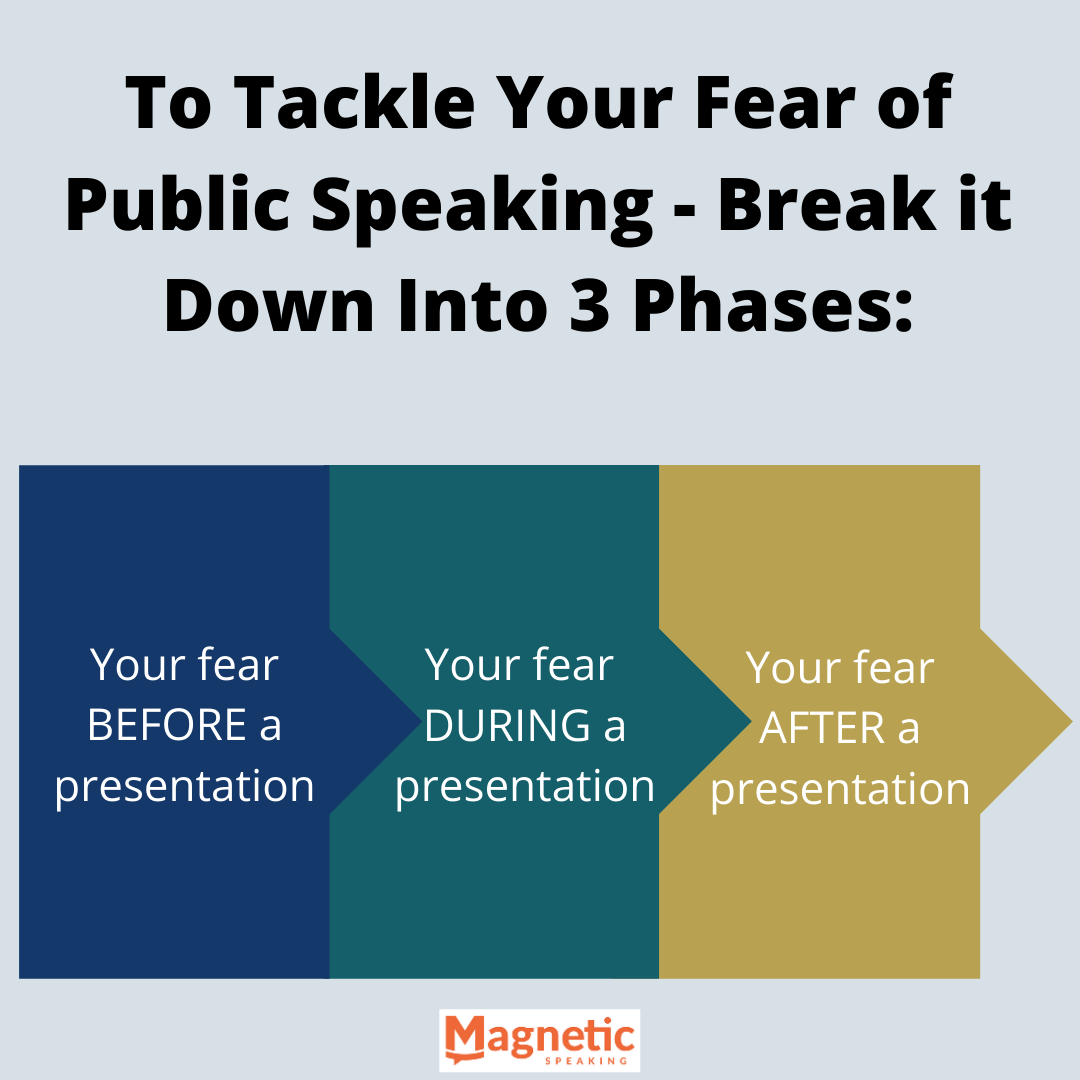In this article I’ll show you how to crush your fear of public speaking as an introvert.
First I’ll define the term introvert and dive into some myths associated with it. Then I’ll explain what causes fear of public speaking for introverts, and finally, how to overcome that fear.
What Is An Introvert
The term introvert was first popularized by psychiatrist Carl Jung in the 1920’s. According to Jung, an introvert turns their mental energy inwards while an extrovert turns their mental energy outwards.
Jung believed no one was 100% either, but instead a mixture of both. With each person’s mind leaning towards one end of the spectrum.
Then in the 1960’s, the psychologist Hans Eysenck added to Jung’s theory and described introvert/extrovert as a difference in the way they gain and recover their energy. Introverts recharge their energy by spending time alone, while extroverts recharge their energy by being around other people.

Myths About Introverts
Let’s debunk some common myths about introverts.

This is a common misconception – many people use the words shy and introverted interchangeably! But introverts aren’t necessarily shy. For example, an introverted person may feel comfortable talking to whomever. But if there are too many people around, the conversation may become superficial and with tons of stimulus coming in, he or she may feel overloaded. If that happens, an introvert might feel compelled to take a pause and find a quiet place for a bit. If that’s not an option, then this person might go into their head and become more silent to recharge their mental batteries.

Introverts do like to talk if it’s an interesting area of conversation for them. It can be difficult for an introvert to keep up small talk for long periods of time with different people. For example, a random social gathering where the introvert doesn’t know many people could be draining and overwhelming.

An introvert’s motivation to be alone is mainly to recharge their batteries or work on something by themselves. Most introverts do like being around other people as long as they have the mental capacity to focus and hold conversation.
Now that we’ve defined what an introvert is let’s look into what causes the fear of public speaking for introverts.
What causes fear of public speaking for introverts
As an introvert, there are some common fears that come up with public speaking. And even if you don’t identify as an introvert, I bet you’ll recognize the fears listed below.
The Spotlight
You know that moment – you’re doing group introductions and it’s your turn. Every person in the room turns their heads and looks at you at the same time. How fun.
Not the type of situation you seek out as an introvert. Reading a book, being in a deep 1-on-1 conversation or having an uninterrupted afternoon to focus heads-down – all better options!
And that’s because introverts gravitate to being behind the scenes and not the center of attention. When you aren’t in the spotlight, things can go at your own pace and there’s plenty of room for receiving and processing information. Hence why you might prefer written communication and smaller groups where there’s more time to think and digest.
These skills of listening and reflecting are invaluable (they’re the secret glue of teams), but they can become a curse if you’re put in the spotlight and your attention is “pulled back” into your head (where you’re only able to focus on what content you want to say or you’re stuck in your thoughts and not paying attention to the group).
Public speaking asks for a wider ability – being able to pay attention to what’s happening in the group AND paying attention to what you want to say. With this means being comfortable with everyone paying close attention to the message you’re broadcasting out. Rather than sitting back and receiving information, you’re now the source, which can be intimidating!
Sounding like a Bullsh*tter
You probably have that friend that is super extroverted and has no issue speaking their mind at all times. It makes for good storytelling, conversation and meeting new people. But you’ve also had that moment where they start going off the cuff too much and it’s unclear if what they’re saying is well thought out. But it doesn’t seem to bother them.
As an introvert, this makes you cringe. You put well-developed ideas on a pedestal, and the thought of sounding like you’re BSing makes you not want to say anything at all.
You like time for preparation and to know exactly what you want to say. When you do speak, you pride yourself on being precise. But the issue is that in many work environments (meetings, hallway conversations, presentation Q&A’s) you’ve got to jump in and speak before you’re 100% ready, unless you want another situation where you don’t speak up.
So this can cause a lot of anxiety and is related to why you don’t like the spotlight either.
Of course, there are many more fears (fear of failure, embarrassment), but these are 2 that block introverts from speaking up. So how do you move past them?
How to Get Over Your Fear of Public Speaking as an Introvert
You can break down your public speaking fear into 3 phases.

Breaking your fear into these phases will make it easier and less overwhelming to deal with, especially as an introvert.
Below I will go into each phase and give you some things that worked for me to deal with my fear of speaking as an introvert.
Fear Before a Presentation
Generally, your speaking anxiety begins long before you are on stage. When I first started doing presentations at work, my fear started from the moment I knew I had to present and kept increasing until I was delivering my speech. It was torture.
Over time I learned to deal with my pre-presentation anxiety, and below are two ways you can too.

As humans, we always imagine the possible future. Some people have a natural tendency to focus their attention on the positive future (I used to be envious of them) and others, like me, have a natural tendency to focus on the negative future. Both focal points are useful in different contexts; however, in the context of speaking anxiety, the positive focus is always better.
If you tend to focus on what could go wrong with your upcoming presentations, then you need to force yourself to put your attention on the things that could go right. If you don’t, then you will have a lot of anxiety building up before the presentation.
I do it by meditating for a few minutes, and then I start imagining myself on stage doing great, and I imagine the end of a presentation, and people are smiling and clapping. I did this exercise every time I started to feel the anxiety building before an upcoming presentation. I don’t have to do this visualization as much now because it became a subconscious habit.

One of my public speaking coaches early on said that “Structure sets you free.” And I am a firm believer in that now. Instead of trying to memorize my presentations word for word, I focus on remembering and understanding the bigger structure behind it.
If you try to write down your presentation word for word and remember it, then you will be contributing to your pre-presentation anxiety in significant ways. You will be worried about saying the right words, and then you will be worried that you can’t remember those words.
Imagine if, instead of that, you remember to address 3 key points in your presentation:
- Background
- Project Update
- Next steps
The big structure is composed of three things only. Then under each item like “Background,” you think of a couple of items to talk about. Walah!
This doesn’t mean you don’t go in each item and talk it out loud. It just means you don’t have to script everything. By creating an overall structure to wrap your head around the main points of what you want to say, you will reduce your pre-presentation fear and anxiety.
Fear During a Presentation

If you do a good job of managing your anxiety before the presentation, then managing your anxiety while presenting should be easier.

Notice that when you get nervous, you start to breathe using your chest and shoulders instead of your diaphragm. You will notice that your chest starts moving up and down, and your abdominal area stops. That’s a bad thing because it will make you feel like you are not getting enough air and in turn, make you more nervous.
The first thing you want to practice is shifting your breathing from chest breathing to abdominal breathing. You have to practice at home until you get good at it.

One of the sources of speaking anxiety is an internal focus. This means you focus a lot of your attention on what you are saying. When you do that, then you activate your internal self-critic and instead of having a dialog with your audience, you end up having a dialog with yourself. Of course, the more you engage the critic, the more anxiety you will feel.
It’s a great idea to let go of your internal critic at that moment and pull your attention outside. One of the ways I do this is to look at one audience member and begin by talking to them only. I almost exclude everyone else in the room and I zoom in on one person and I say “Hi, I am glad you are here, today I want to present on xyz…..”
Once the first sentence gets out to one person, then my brain relaxes, and I start shifting my attention to others. I keep doing this until my presentation is over. Every time I start retreating in my head with concerns, I quickly shift back out by talking to one person.
In a virtual environment, this can be modified by following the triangle method of eye contact as explained in this article.
Fear After a Presentation
It’s intuitive to think of the anxiety before and during a presentation. However, most people forget that fear can get you even after a presentation is over. If you beat yourself up after a presentation for things you did or said (or did not do or say), then you experience post-presentation anxiety. If you don’t handle this anxiety, it will contribute to your pre and during anxiety next time. It’s a vicious cycle that keeps going until you break it at all the phases!
Here are two tips for after a presentation.

One time I heard Tiger Woods telling a reporter about his routine after a golf match. Tiger said after an event, he sits on his couch and plays in his head the best shot of the game.
When I heard Tiger say that I thought….hmmm after a presentation, I usually play over the worst part! If you are honest with yourself, then most likely you do the same – it’s human nature.
I knew then that I had to change and started consciously working on remembering positive things from my presentation. I have to say it was challenging at first; my brain did not want to even to go there. Over time it got easier and now this is a technique I teach to all my clients.
Here is a challenge for you if you want to break that anxiety cycle. After your next presentation, sit down and write down 3-5 things you liked about your presentation. Every time your brain goes to what went wrong, ignore it for now and go back to the positive.
I am not saying don’t look at the negative. I am saying since you have a natural inclination to look at what you did wrong, try to balance that out consciously by focusing on what went well.

Everyone makes mistakes when presenting. Some people take it in stride and improve, and some never try again. The difference is that the first group is deciding to interpret the errors as feedback to improve their performance for the next time. The second group is viewing the mistakes as failures and concluding that they will never be good at presenting.

A mentor of mine once said that “every master was once a disaster.” I believed him. That helped me be humble when learning new things because I expected to make mistakes.
One of my goals for 2018 was to learn chess and become good at it. After playing my first game online, I got a very low rating of 900. From there, I started playing everyday. For all of 2019, I studied and analyzed my mistakes with almost zero improvements. Suddenly in 2020, my rating started going up and within a month I scored 1400. Now, 1400 is an intermediate-beginner level and not a big deal to a skilled chess player, however, it was important to me. Now, my goal is to get to the 1600 level (advanced beginner), and I know it will take a lot of work.
Just like in learning chess (or anything), you should go into it knowing that you will make mistakes. If you take the mistakes objectively as feedback, you will improve. If you take the mistakes as proof of a belief that you are not good at public speaking, then you will be stuck.
By shifting your mindset and using these strategies and tips you can take real steps toward improving your public speaking skills and breaking through fear. I can tell you from personal experience as well as from working with hundreds of clients – all it takes is commitment.




